Framer vs Tilda: Final verdict
Comparing Framer vs Tilda shows where each shines in different areas, making them suitable for various users.
Framer (Overall Grade: 7.1/10)
performs well in design and customization. Its AI tools are a big plus, assisting you with content generation and localization. This makes website design easier for both new and experienced users. However, Framer has a learning curve. Also, it doesn’t come with native ecommerce features, which might limit its use if you plan to run an online store.
Tilda (Overall Grade: 6.7/10)
is great for a no-code building experience. It offers many pre-designed blocks and templates. Its focus on typography and visual content is noteworthy. If you need ecommerce functionalities, Tilda provides product catalogs and payment gateways, making it useful for small businesses and digital marketers. It is easier to use compared to Framer and has strong ecommerce support.

|

|
|
|---|---|---|
Design functionalities & templates |
8.5 |
8.6 |
Ease of use |
7.1 |
8.0 |
Ecommerce |
5.9 |
7.2 |
Website Editors |
7.6 |
8.0 |
Product testing options |
6.2 |
5.9 |
Price |
7.7 |
8.0 |
Hosting quality |
7.1 |
6.2 |
Website speed optimization |
7.4 |
4.9 |
Plugins and integrations |
7.6 |
7.6 |
Marketing features |
7.2 |
6.9 |
Customer support |
5.6 |
5.5 |
Security |
8.2 |
7.6 |
AI capabilities |
7.6 |
2.1 |
User Management |
7.4 |
7.3 |
Which one is the best for ecommerce: Framer or Tilda?
 5.9
5.9
 7.2
7.2
Verdict
: Tilda is the better choice for ecommerce, offering a more full-featured platform than Framer.
Framer
: Framer stands out for its design capabilities but lacks native ecommerce features. It heavily depends on integrations like Ecwid for ecommerce functionalities. If your main focus is design flexibility and customization, Framer is a good choice. However, managing an online store might be challenging due to its limited ecommerce tools.
Tilda
: Tilda performs better with a higher ecommerce score of 7.2. It provides a wide range of ecommerce features such as product catalogs, inventory management, and payment gateways. Tilda is user-friendly, visually appealing, and ideal for small businesses and digital marketers who want to set up an online store effortlessly. This makes Tilda a more substantial option for those who prioritize ecommerce capabilities without needing a lot of coding skills.
Which one is the best for informational and business websites?
 7.5
7.5
 8.4
8.4
Verdict
: Tilda is the superior choice for creating informational and business websites, thanks to its user-friendly interface and broad options for customization. Framer, while powerful, is better suited for users with some design experience.
Framer
: Framer offers a mix of AI-driven design and an easy-to-use interface, providing a versatile tool for new and experienced designers. It provides customization through a large component library and AI tools for content creation and localization. However, beginners might find it challenging, as it lacks built-in e-commerce features. Framer scores 7.5 in this category.
Tilda
: Tilda stands out with its variety of pre-designed blocks and templates, allowing you to create professional websites without coding. It focuses on typography and visual content and integrates with services for analytics, email marketing, and payment solutions. Tilda scores 8.4, making it the choice for informational and business websites.
Framer vs Tilda: Detailed comparison
Design functionalities & templates
Design FunctionalitiesRepresents how well each platform allows for creative design and customization of websites.Score Components:
- Template Variety (30%): Range and quality of design templates.
- Customization (30%): Flexibility and options for design alterations.
- User Interface (20%): Ease and intuitiveness of the design process.
- Responsiveness (10%): Adaptability to different devices and screen sizes.
- Innovation (10%): Unique design features and tools.
 8.5
8.5
 8.6
8.6
🏆
Winner: Tilda.
Although Framer vs Tilda offers a wide range of templates and design functionalities, Tilda slightly edges out Framer with its automatic mobile responsiveness and in-depth customization options.
Framer provides over 1,000 customizable templates suitable for different industries. You can expect features like responsive design, real-time collaboration, and import options from other tools. These templates can be modified to fit various projects.
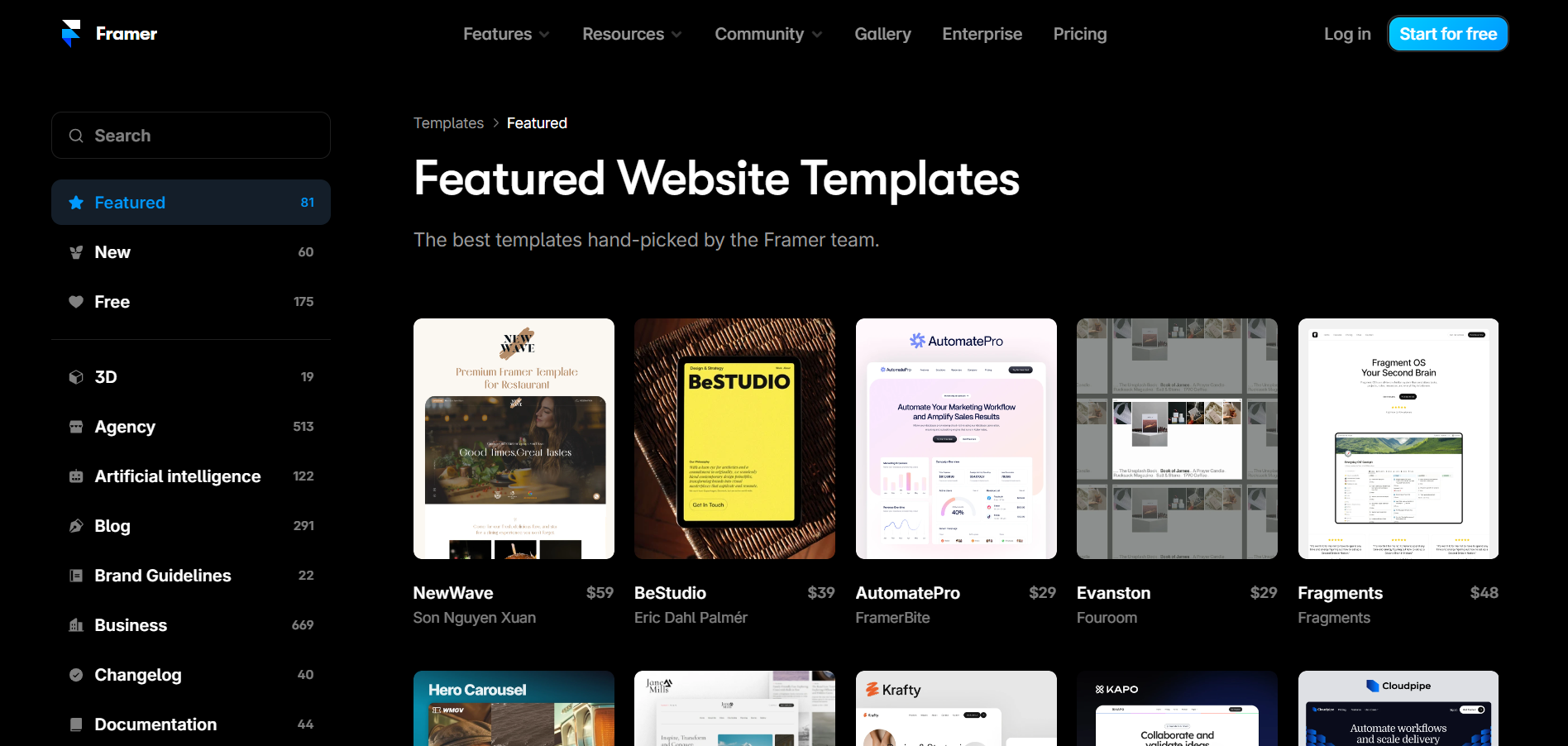

Tilda focuses on beautiful typography and clean blocks. Each template can be significantly modified or created from scratch. The platform ensures your website looks great on mobile devices with automatic mobile responsiveness.
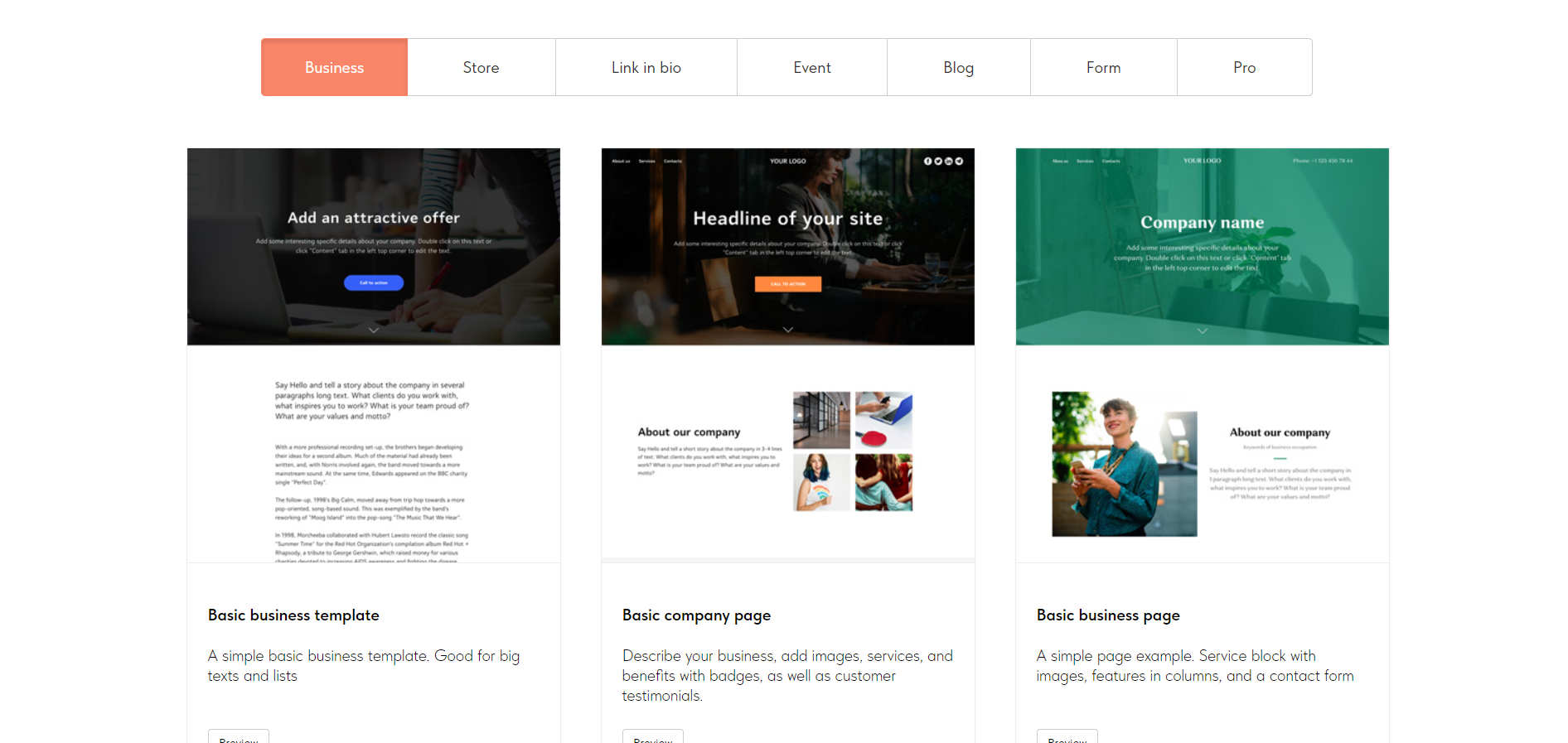
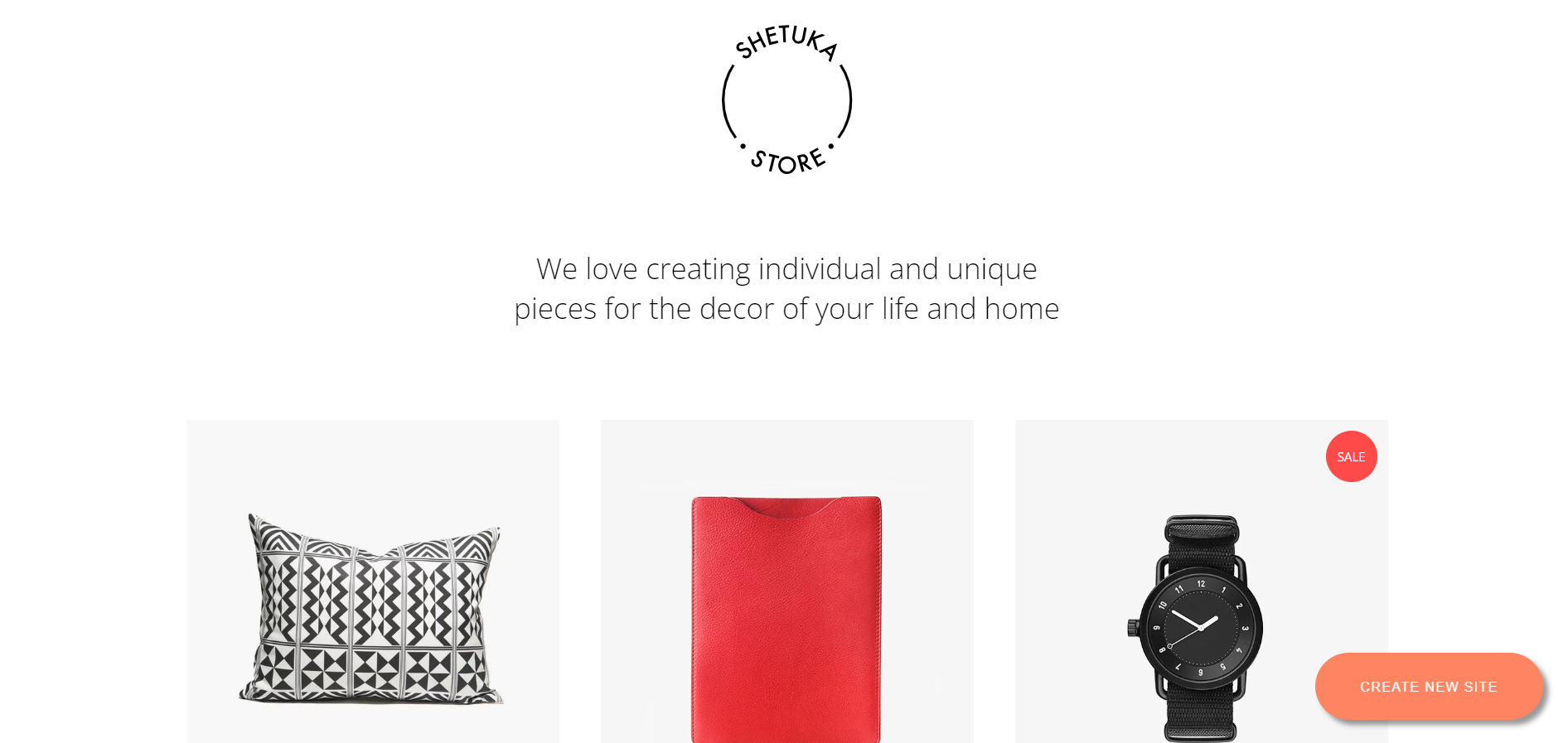
Get a head start on website creation with AI
Create a custom website tailored to your business needs 10X faster with 10Web AI Website Builder!
Ease of use
Ease of useReflects the platform’s overall user-friendliness.Score
Components:
- Learning curve (40%): Quickness and ease of getting started.
- Interface design (30%): Simplicity and intuitiveness of layout.
- User guidance (20%): Quality of tutorials and support.
- Flexibility (10%): Adaptability to various user skills.
 7.1
7.1
 8.0
8.0
🏆 Winner: Tilda.
Tilda is praised for its easy-to-use drag-and-drop interface, scoring 8.0. It offers modern and responsive templates for various industries. The Zero Block feature in Tilda allows detailed control over design elements for those needing more specific layouts. This builder supports responsive design and includes built-in SEO tools and analytics.
Learning Resources
🏆 Winner: Framer.
Framer offers diverse learning resources through Framer Academy, covering topics like scroll animations and localization. These materials cater to both beginners and advanced users.
Tilda also provides resources for creating websites, online stores, and courses without coding skills. It focuses on design flexibility, content presentation, and SEO optimization.
For ecommerce
EcommerceMeasures the platform’s effectiveness in supporting online business activities.Score Components:
- Ecommerce themes and templates (20%): Variety and design of templates.
- Product management (25%): Ease of managing and organizing products.
- Payment options (25%): Variety and convenience of payment methods.
- Ecommerce features (20%): Features for managing an ecommerce store.
- Integration (10%): Compatibility with external e-commerce tools and services.
 5.9
5.9
 7.2
7.2
Regarding ecommerce, Tilda outperforms with integrated features like product catalogs, inventory management, payment gateways, shipping options, CRM, and marketing tools. Tilda scores 7.2 in ecommerce and supports online store creation without coding.
Framer does not have native ecommerce features but relies on third-party integrations, like Ecwid. Its focus is more on design, scoring 5.9 in ecommerce.
 |
 |
|
|---|---|---|
Ecommerce themes and templates |
7.0 |
6.5 |
Product page customization |
5.5 |
7.0 |
Payment processing and commissions |
6.5 |
7.5 |
POS capabilities |
3.0 |
0.0 |
Payment gateways |
6.0 |
7.8 |
Product numbers |
6.0 |
6.0 |
Additional ecommerce features |
5.5 |
6.5 |
Framer ecommerce features:
- Ecwid integration
Tilda ecommerce features:
- Product Catalogs and Inventory management
- Payment Gateways integration
- Shipping options
- Order management
- Built-in CRM and marketing tools
Ecommerce themes & templates
Framer provides 97 ecommerce-specific website templates, offering a variety of options to suit different business needs. These templates are highly customizable, allowing you to easily adjust colors, fonts, and layouts and integrate essential ecommerce tools. With free and paid options available, Framer caters to businesses of all sizes looking to improve their online presence and boost sales.
Tilda offers around 20 ready-made templates for building ecommerce sites, designed to be user-friendly and require no coding or web design skills. The platform focuses on creating a smooth shopping experience, with features like adding items to the cart, viewing product details, customizing services such as delivery, and selecting payment methods.
Product page customization
Framer offers flexibility mainly in design. Customizing product pages requires integrating with platforms like Shopify and Ecwid.
Most changes involve layout and design but not deep ecommerce functions.
Tilda allows various customizations for product pages, such as product variants, delivery options, promotional codes, and different payment systems.
It also supports content personalization for different customer preferences.
Payment processing
Framer uses Stripe for payment processing, supporting different payment options, including one-time payments and subscriptions.
However, Framer does not mention native POS functionality.
Tilda supports Stripe, PayPal, and 2Checkout for payment processing, allowing straightforward integration.
There are no extra transaction fees other than those from the payment gateways. Tilda also includes “Cash on Delivery” options.
Website Editors
Website EditorsEvaluates the platforms’ website building and editing capabilities.Score Components:
- Customization tools (40%): Range and power of editing features.
- Editor usability (30%): User experience within the editor.
- Design flexibility (20%): Freedom in layout and design changes.
- Update and maintenance ease (10%): Simplicity of updating and maintaining the site.
 7.6
7.6
 8.0
8.0
🏆
Winner: Tilda.
Tilda, rated 8.0, provides a user-friendly, block-based design system that makes website creation simple, even without coding skills. For more advanced customization, the Zero Block feature offers detailed control over design elements, which is ideal for creating specific layouts. Tilda also supports responsive design to ensure your site looks great on any device. It comes with built-in SEO tools and analytics and integrates with various third-party services to enhance functionality.
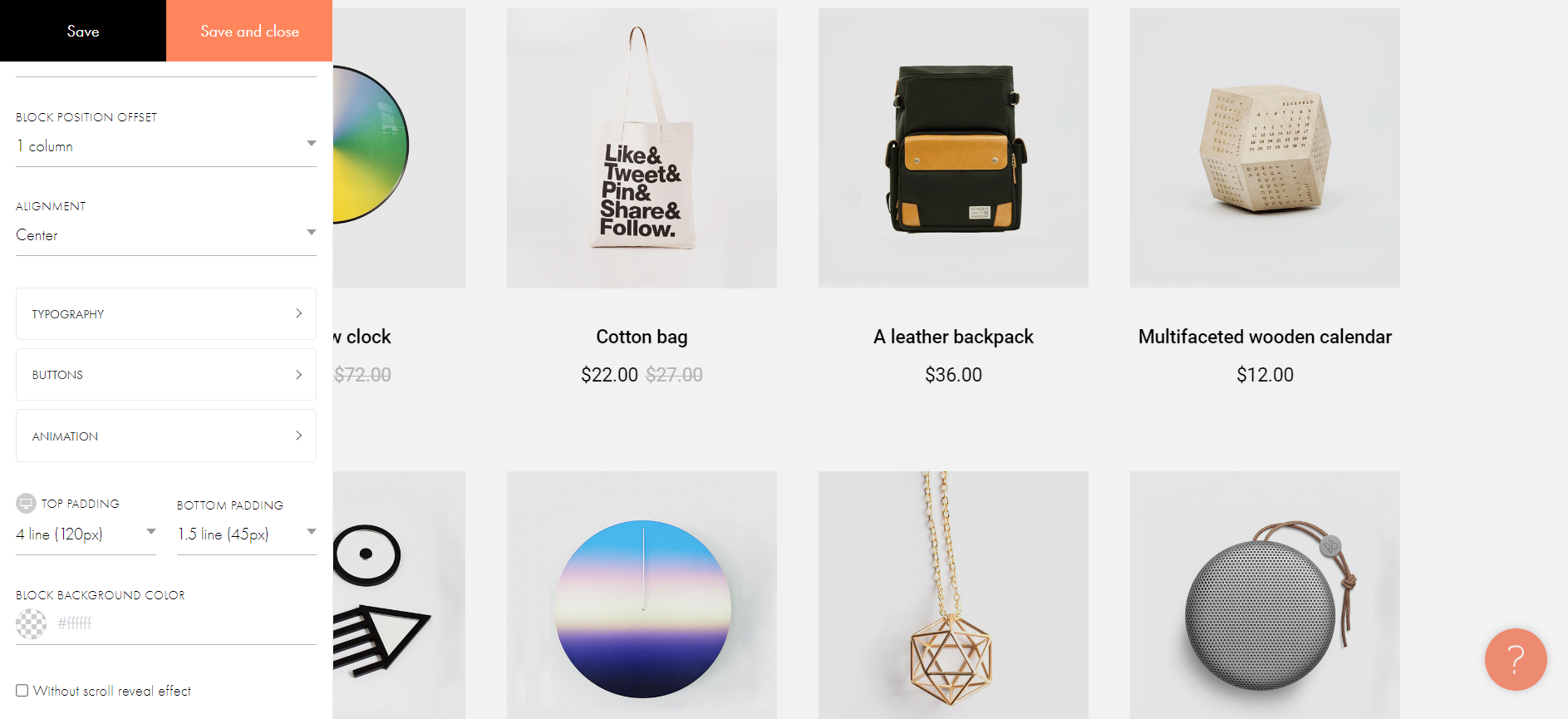
Framer’s website builder editor, with a score of 7.6, is built for high-fidelity prototyping and complex animations, which is an excellent option for designers and developers. It offers powerful tools for creating interactive and responsive designs, including a variety of pre-built components, real-time collaboration, and integration with other design tools. Framer’s editor allows users to craft detailed animations, fine-tune interactions, and test designs across different screen sizes and devices.
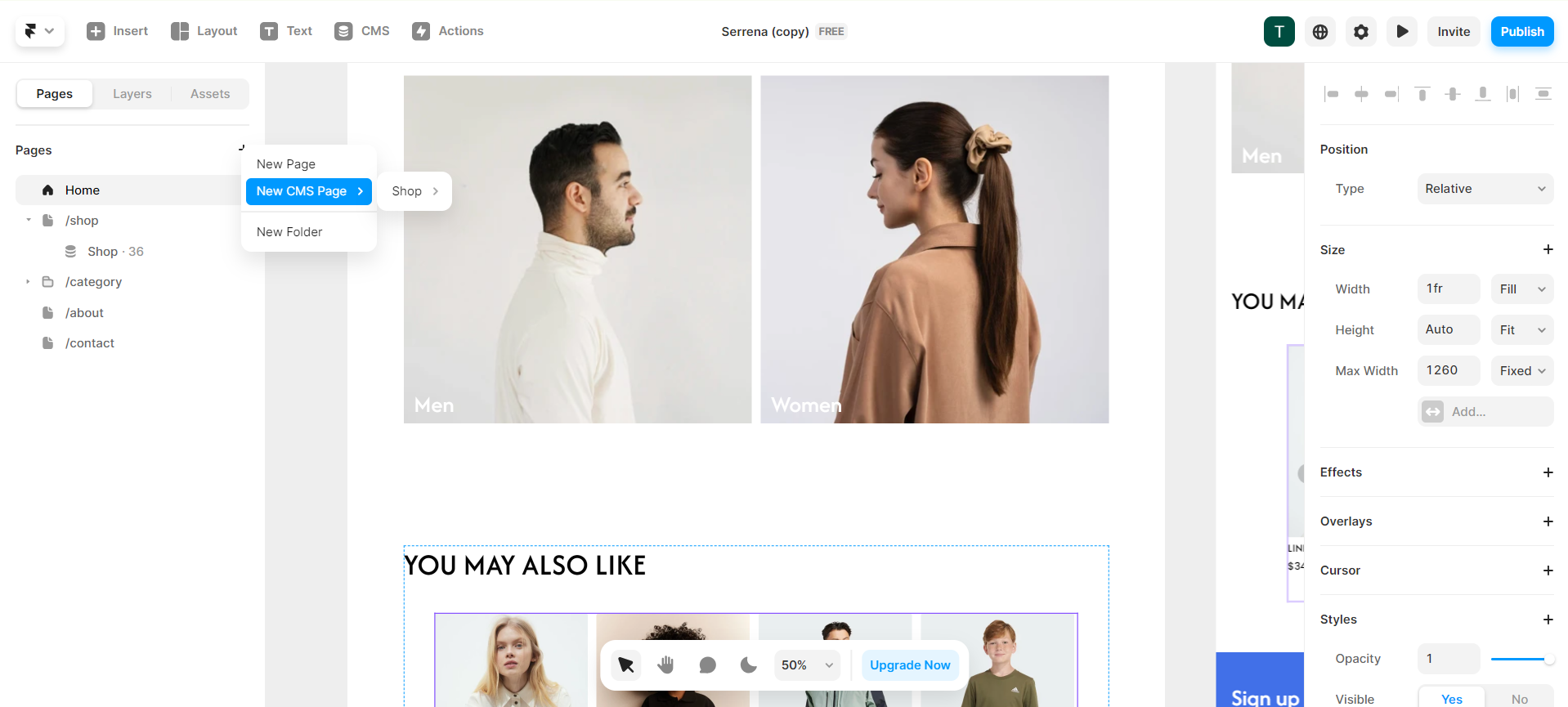
Mobile editor/app
 4.5
4.5
 5.5
5.5
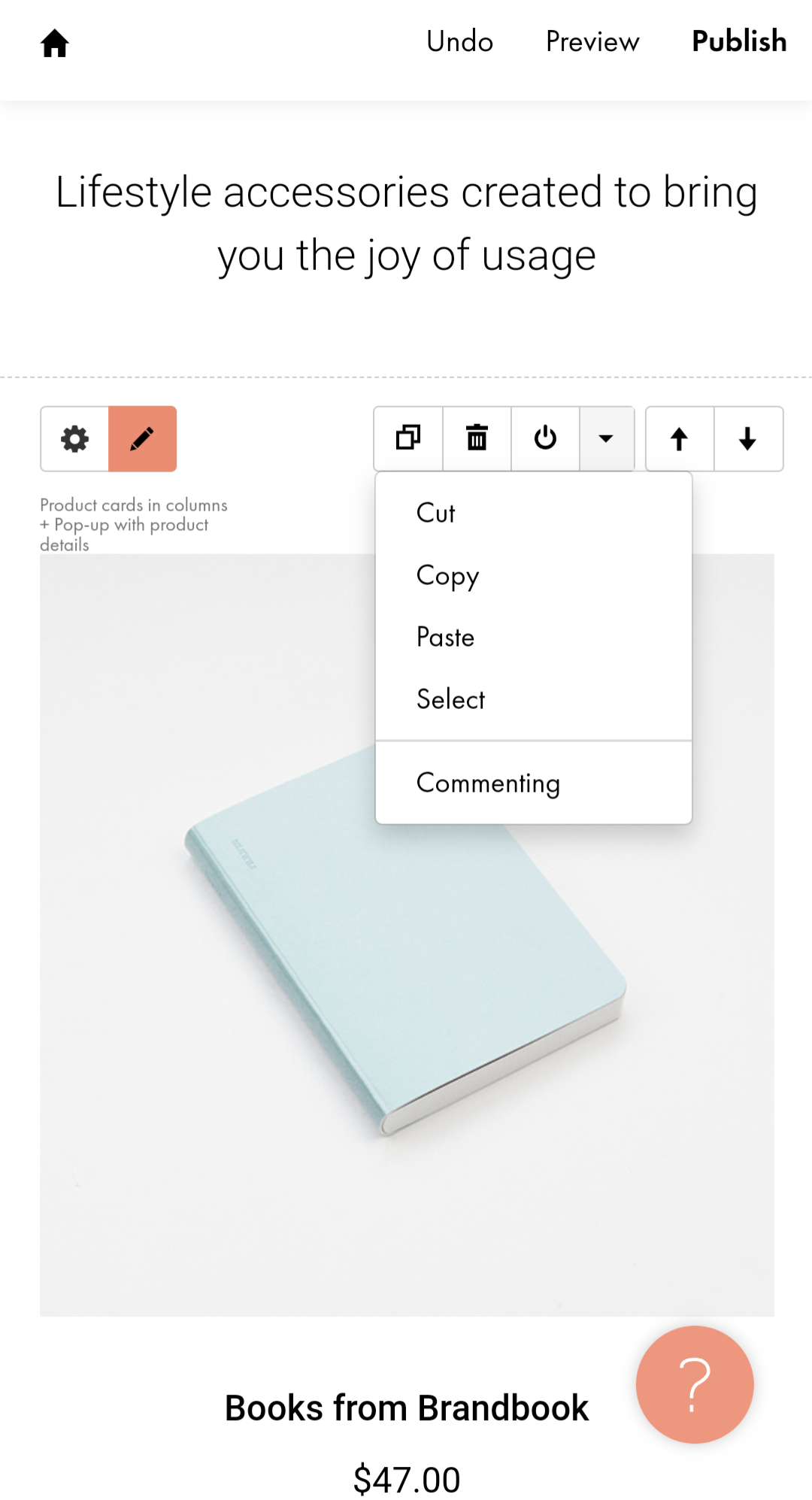
🏆
Winner: Tilda.
Neither Framer nor Tilda offers a dedicated mobile editor app, but both allow website modifications through a mobile browser.
However, Framer’s mobile browser version is often considered less convenient, giving Tilda a slight advantage.
Tilda’s mobile browser editor is more user-friendly, allowing for easier management and editing of websites on the go. In summary, Tilda ranks higher for its convenience and ease of use in mobile browser editing. At the same time, Framer may feel less intuitive for mobile users.
Product testing options
Product Testing OptionsAssesses the options for trying out platform features before commitment.Score Components:
- Trial quality (40%): Extent and usefulness of the trial or free version.
- Feature accessibility (30%): How many features are available to test.
- Trial duration (20%): Length of the trial period.
- Ease of transition (10%): Smoothness of moving from trial to paid plans.
 6.2
6.2
 5.9
5.9
Overall Result
:
Framer wins.
Framer scores slightly higher than Tilda in product testing, with a 6.2 compared to Tilda’s 5.9. Both platforms offer free versions and allow users to test some premium features. However, Framer has the advantage of offering a money-back guarantee in certain regions, a benefit Tilda does not provide.
 |
 |
|
|---|---|---|
Free Plan |
Yes | Yes |
Trial Duration |
No | No |
Testing Premium Features |
Possible with free version | Possible with free plan |
Money Back Guarantee |
In some regions |
No |
Price
PriceLooks at the cost-effectiveness and value for money of each platform.Score Components:
- Plan value (40%): What each pricing tier offers.
- Transparency and clarity (30%): Clearness of pricing structures.
- Flexibility of plans (20%): Range of options to suit different budgets.
- Hidden costs (10%): Additional expenses not included in the plan.
 7.7
7.7
 8.0
8.0
Tilda has a slightly higher price score than Framer, suggesting it may offer better value for money.
However, Framer provides a wider range of plans, including a custom-priced Enterprise option for large-scale websites, which Tilda lacks. Both platforms offer discounts for annual subscriptions, but Framer’s discount is more generous, offering up to 50% off compared to Tilda’s maximum of 30%.

|

|
|
|---|---|---|
Free |
Free (Free/month): Allows 3 websites built on a framer.website subdomain with Framer branding in the footer. Limited to 1,000 traffic visitors and 1,000 CMS items. |
Free ($0/month): Tilda’s Free plan allows for 1 website with up to 50 pages per website and 50 MB of space per project. It includes a free subdomain on tilda.ws, responsive design on all devices, basic animations, a built-in image and icon library, and Tilda CRM. |
$10-$20 |
Mini ($10/month): Removes Framer branding, allows using a custom domain, includes collaboration with an additional cost for extra editors, custom code embedding, e-commerce support, and limited CMS items. Offers a monthly visitor limit of 2,000 and 1GB bandwidth. Value for price: 6.5 |
Personal ($15/month): The Personal plan offers 1 website with up to 500 pages and 1 GB of space. It includes all features of the Free plan plus the ability to connect a custom domain, advanced animations, full access to the Block Library, analytics, SEO tools, and online store capabilities. Value for price: 7.5 |
$15-$20 |
Basic ($20/month): Offers all Mini features plus increased limits for CMS items (1,000) and traffic (10,000 visitors per month), along with 10GB bandwidth. Value for price: 7.5 |
No offering at this amount. |
$20+ |
Pro ($30/month): Enhances Basic plan features with a significant increase in CMS items (10,000), traffic (100,000 visitors per month), and bandwidth (100GB), among other advanced features. Value for price: 8.5 |
Business ($25/month): The Business plan expands capabilities to 5 websites per account, each with up to 500 pages and 1 GB of space, including source code export and API access. It builds upon the Personal plan features with additions suitable for more extensive business needs. Value for Price: 9.0 |
Hosting quality
Hosting
qualityExamines the reliability and performance of the hosting solutions.Score Components:
- Uptime (40%): Consistency and reliability of website availability.
- Speed (30%): Loading times and performance.
- Bandwidth and storage (20%): Sufficiency of resources provided.
- Data centers (10%): Quality and distribution of hosting infrastructure.
 7.1
7.1
 6.2
6.2
🏆
Winner: Framer.
Framer and Tilda include cloud hosting with their plans. However, Framer offers more storage options and an uptime guarantee for its enterprise plan. While both platforms promise 99.9% uptime, Framer’s guarantee gives it a slight advantage. Additionally, Tilda does not disclose its data center locations, which might concern users who prioritize transparency in data storage.
 |
 |
|
|---|---|---|
Do they offer hosting? |
Yes, included in all plans |
Yes, cloud hosting with up to 1GB storage capacity |
Data Centers: |
4 globally: 2 in US, 1 in Ireland, 1 in Singapore |
Tilda does not disclose the locations of its data centers |
Type of hosting: |
Cloud Hosting |
Cloud Hosting |
Uptime: |
99.9% |
99.9% |
Uptime Guarantee: |
Only for enterprise plan, 99.99% |
No |
Website Speed Optimization
Website Speed OptimizationEvaluates optimization of website loading timesScore Components:
- PageSpeed Score (30%): Google’s score indicating performance optimization.
- Loading Time (30%): The average time until a website is fully interactive.
- Mobile Optimization (15%): Optimization effectiveness for mobile devices.
- Resource Optimization (15%): Optimizing images, scripts, and other heavy resources.
- CDN Usage (10%): Use of CDN to enhance speed across geolocations.
 7.4
7.4
 4.9
4.9
🏆 Winner: Framer.
Both Framer vs Tilda focus on website performance and page speed. However, Framer has an advantage with its more thorough strategies for speed optimization and a strong emphasis on improving Core Web Vitals. This focus gives Framer an edge over Tilda in terms of overall performance.
 |
 |
|
|---|---|---|
Focus |
Code Minification, Pre-Rendering, Caching, Image optimization |
Lazy Loading, Image Optimization |
Performance Tools |
Google Lighthouse, PageSpeed Insights |
Google PageSpeed Insights |
Key Strategies |
Code Minification, Pre-Rendering, Caching, Image optimization |
Lazy Loading, Image Optimization |
Load Times |
Varies depending on optimization and website complexity |
Varies depending on optimization and website complexity |
Page Speed Scores Range |
Varies depending on optimization and website complexity |
Varies depending on optimization and website complexity |
Core Web Vitals Improvement |
Emphasis on LCP, FID, CLS improvements |
No information provided |
Framer enhances site speed through strategies like code minification, pre-rendering, caching, and image optimization. It also focuses on improving the three Core Web Vitals—Largest Contentful Paint (LCP), First Input Delay (FID), and Cumulative Layout Shift (CLS)—making it a strong option for optimizing website speed.
Tilda, by contrast, focuses on lazy loading and image optimization to boost performance but does not provide specific details on improving Core Web Vitals. This lack of information could be a drawback for users prioritizing these metrics for better website performance.
Get a head start on website creation with AI
Create a custom website tailored to your business needs 10X faster with 10Web AI Website Builder!
Plugins and integrations
Plugins and integrationsMeasures the range and effectiveness of additional plugins and integrations.Score Components:
- Variety of options (40%): Range of available add-ons.
- Integration smoothness (30%): Ease of integrating plugins into the site.
- Quality of plugins (20%): Functionality and reliability of the options.
- Custom integration capabilities (10%): Support for custom or third-party integrations.
 7.6
7.6
 7.6
7.6
🏁 It’s a tie.
Both Framer and Tilda score 7.6 in plugins and integrations. Framer offers a variety of plugins for different needs, including forms, video and animation, social media integration, audio, and utility functions. Meanwhile, Tilda integrates with a wide range of services to enhance website functionality, such as popular payment processors, form services, CRM tools, automation tools, and analytics services. Both platforms provide a solid selection of plugins and integrations that significantly extend the capabilities of websites built on them.
Marketing Features
Design FunctionalitiesRepresents how well each platform allows for creative design and customization of websites.Score Components:
- Template Variety (30%): Range and quality of design templates.
- Customization (30%): Flexibility and options for design alterations.
- User Interface (20%): Ease and intuitiveness of the design process.
- Responsiveness (10%): Adaptability to different devices and screen sizes.
- Innovation (10%): Unique design features and tools.
 7.2
7.2
 6.9
6.9
Overall Winner: Framer.
Framer vs Tilda offers similar marketing features, though Framer scores slightly higher in this area. However, neither platform includes built-in ads or promotions features, which could be a limitation for businesses looking to run marketing campaigns directly from their site.
 |
 |
|
|---|---|---|
SEO Tools |
||
Email Marketing |
||
Blogging |
||
Social Media Integration |
||
Analytics and Reporting |
||
Ads and Promotions |
Customer Support
Customer supportEvaluates the quality and availability of support options.Score Components:
- Response time (40%): Speed of support responses.
- Support quality (30%): Effectiveness and helpfulness of the support.
- Availability (20%): Range of support channels (phone, chat, email).
- Resource richness (10%): Quality of self-help and educational materials.
 5.6
5.6
 5.5
5.5
🏆 Winner: Framer.
In comparing Framer vs Tilda, Framer slightly outperforms in customer support with a score of 5.6 compared to Tilda’s 5.5. Framer provides self-help resources through a community forum, knowledge base, and email support. While details on availability aren’t specified, the community forum adds an extra layer of support.
Tilda primarily offers email support and directs users to its Help Center, which is filled with articles and tutorials. Although Tilda’s support is comprehensive, it lacks the community-driven forum Framer provides, which can be a helpful resource for troubleshooting and advice.
Security
SecurityLooks at the platforms’ security measures and data protection.Score Components:
- Data protection (40%): Safeguards for user and customer data.
- SSL and encryption (30%): Implementation of secure connections.
- Compliance (20%): Adherence to industry security standards.
- Regular updates (10%): Frequency of security updates and patches.
 8.2
8.2
 7.6
7.6
🏆
Winner: Framer.
Framer takes a comprehensive approach to security, utilizing Amazon Web Services (AWS) for hosting and encryption, and implementing strict organizational security policies. They also prioritize product security through secure development practices, external security testing, and a bug bounty program.
Although it may not offer the same level of specialized ecommerce security features as Framer, Tilda is committed to maintaining a secure platform for all types of websites. This includes measures to ensure GDPR compliance and enhance the privacy and security of websites created with its platform. These include features for cookie consent, privacy policies, GDPR-friendly forms, and options for managing data retention and deletion. Additionally, Tilda provides built-in security features such as DDoS prevention and HTTPS encryption to safeguard user data.
AI Capabilities
AI capabilitiesMeasures the effectiveness of AI-driven features and tools.Score Components:
- Automation efficiency (40%): Impact of AI on streamlining processes.
- Personalization (30%): AI-driven customization for users or customers.
- AI-Assisted design (20%): Role of AI in website design and functionality.
- Data analysis (10%): Use of AI in interpreting user data and analytics.
 7.6
7.6
 2.1
2.1
 |
 |
|
|---|---|---|
AI Builder |
Framer’s AI builder simplifies the process of creating and optimizing web content |
Tilda does not have an AI website builder |
AI Ecommerce features |
||
AI Content Generation |
Framer’s AI enhances website creation with features like AI Translation, Text Rewrite, and Headline Generator |
Tilda’s AI feature for generating website content is limited to headlines and text blocks |
Additional AI Features |
Framer’s AI Style and AI Photo Generating and Editing tools offer a high degree of customization for multilingual websites and instant image creation and editing capabilities |
Tilda does not have other AI features apart from text generation |
🏆 Winner: Framer.
Framer, scoring 7.6, provides a variety of AI features that streamline the website creation process, such as content generation, localization, and photo editing. These tools make Framer’s AI capabilities more versatile and impactful than Tilda’s, offering users greater flexibility and efficiency in building their websites.
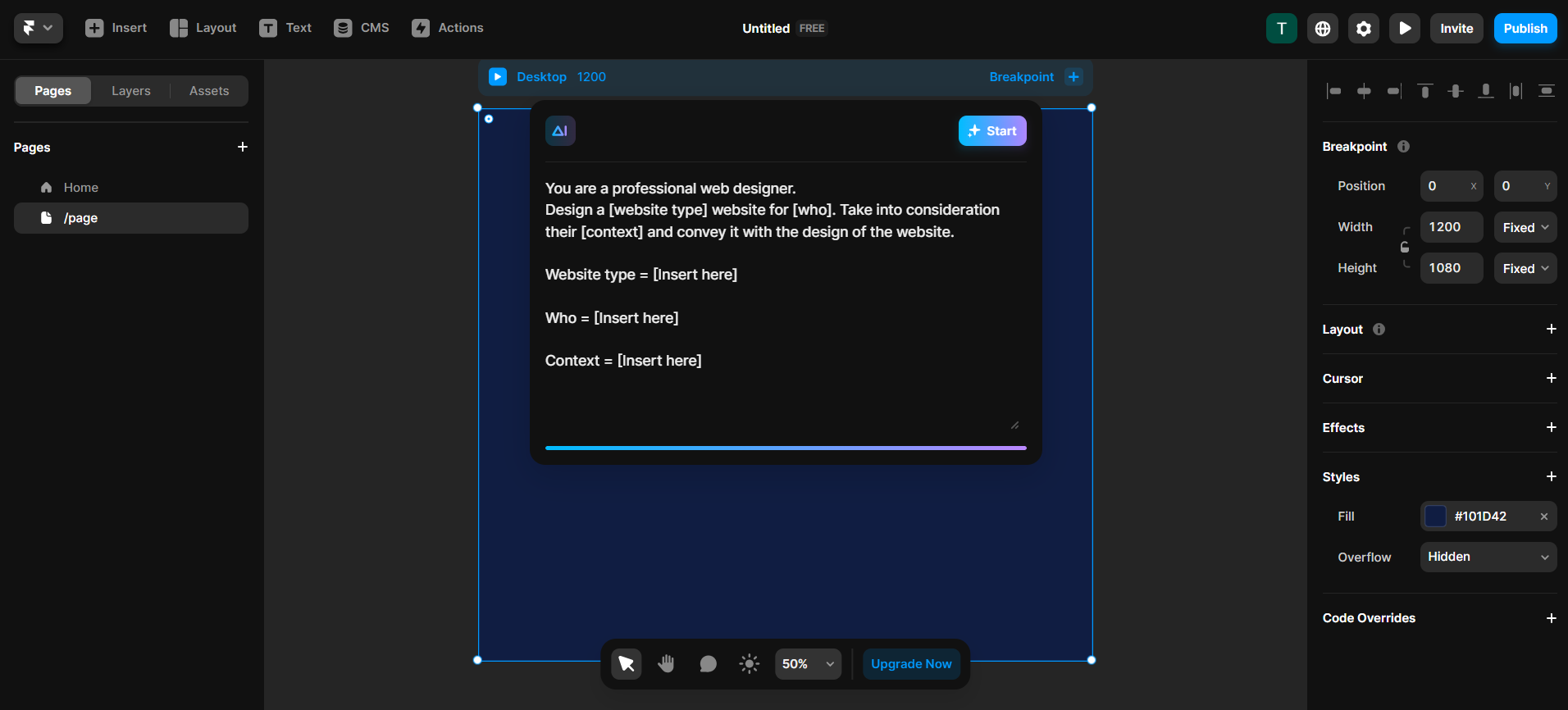
With a score of 2.1, Tilda has limited AI capabilities, primarily focused on text generation. While this can be helpful for creating website content, it lacks the versatility and broader functionality that Framer’s AI features provide, making Tilda’s AI offerings less impactful by comparison.
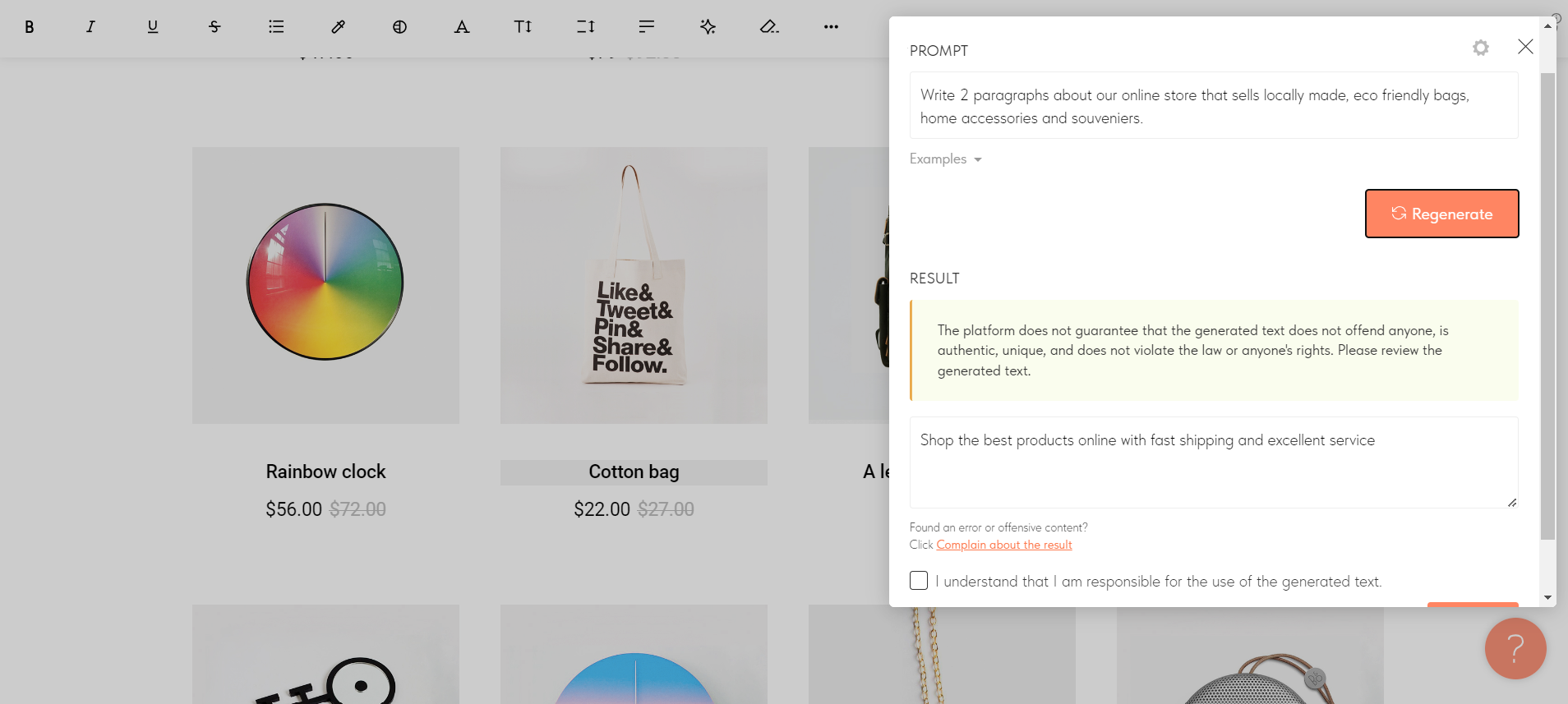
User Management
User ManagementAssesses the platforms’ capabilities in managing user roles, permissions, and accessibility.Score Components:
- Role Customization (40%): Flexibility in creating and defining user roles and
permissions. - Ease of Management (30%): User interface and tools for managing users.
- Access Control (20%): Effectiveness of access control measures for different user
levels. - Scalability (10%): Ability to manage a growing number of users efficiently.
 7.4
7.4
 7.3
7.3
🏆 Winner: Framer.
Framer vs Tilda offers collaboration features, but Framer provides more detailed role-based access control.
- Framer supports team collaboration with various plans: the Team Basic plan allows up to 5 editors, while the Team Pro plan supports up to 10 editors. These plans include additional features like live collaboration, comments, file storage, and extended version history.
- Tilda’s Collaborators feature enables adding teammates with either Full or Limited access. Full access allows collaborators to edit, publish, delete pages, view requests and statistics, and manage website services. Limited access lets the project owner control specific actions the collaborator can perform.
Framer User Roles and Access Levels:
| Role | Description | Access Highlights |
|---|---|---|
| Designer | Focuses on the aesthetic and UI/UX aspects of the website. | Can create and modify design elements, utilize animation libraries like Framer Motion, and implement accessibility settings. |
| Content Editor | Manages and curates content for the website, including text, images, and other media. | Can edit CMS content, use localization features for different regions, and modify SEO settings. |
| Developer | Works on more technical aspects, such as custom code and integrations. | Has access to deploy options, can use custom domains, manage project permissions, and apply custom code for further optimization. |
| Project Manager | Oversees the project, coordinating between different roles and ensuring the project meets its deadlines and goals. | Can invite collaborators, assign roles and permissions, and manage versions and rollbacks for efficient site management. |
| Collaborator (General) | A role that can encompass various levels of access based on project needs, including design, content, and deployment tasks. | Access can be customized to include a mix of design, content, and deploy permissions based on the project’s needs and the individual’s role within the team. |
Tilda does not provide a detailed breakdown of user roles and access levels.
Additional Features
 |
 |
|
|---|---|---|
SSL Certificate |
||
Custom Domain |
||
Free Custom Domain Included |
||
International Domains |
||
Mobile Responsive |
||
Page Speed |
||
Website Builder Mobile App |
||
Convert a Website To An App |
||
Website Analytics |
||
Multilingual Sites |
||
Multiple Users |
Framer vs Tilda: User Feedback
Framer earns high praise for its user-friendly, no-code approach to web and prototype design, offering many tutorials, templates, and drag-and-drop features that speed up the design process. Users appreciate its integration with tools like Figma, AI-generated responsive designs, and real-time collaboration capabilities. However, some critiques highlight a steep learning curve for beginners and limitations in customer support and features without premium access. Despite these challenges, Framer is widely recognized as a powerful tool that boosts creativity and efficiency in web development.
Tilda Publishing receives mixed feedback from users. It’s praised for offering a no-code, customizable website-building experience, with features like Zero Block for personalization and a simple backend setup. Users also appreciate its affordability, intuitive interface, and responsive customer support. However, there are criticisms of buggy font customization, limited design elements, and occasional instability in some features. Despite these drawbacks, many find Tilda effective for quickly creating professional websites and managing multiple sites under one plan, though some caution about potential stability issues and customer support limitations.
The making of this blog
We followed a clear, step-by-step process to write and research this article.
Framer vs Tilda: FAQ
Which platform is better for ecommerce, Framer or Tilda?
Can I use Framer and Tilda for creating informational and business websites?
How do Framer vs Tilda compare in terms of design functionalities and templates?
Which platform offers better ease of use?
How do the website editors of Framer and Tilda compare?
Which platform has better customer support?
How do Framer and Tilda handle website security?
Which platform is better for AI capabilities?
Can I manage multiple users on both Framer and Tilda?
What are the main differences in additional features between Framer vs Tilda?









